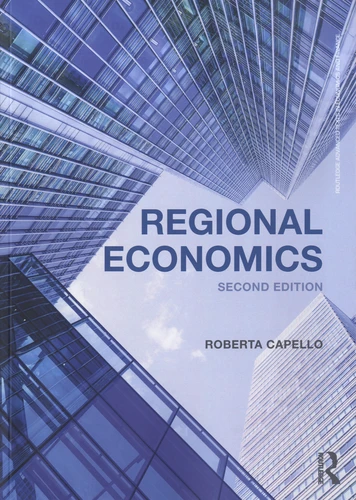Regional Economics
2nd edition
Par : Formats :
- Paiement en ligne :
- Livraison à domicile ou en point Mondial Relay indisponible
- Retrait Click and Collect en magasin gratuit
- Réservation en ligne avec paiement en magasin :
- Indisponible pour réserver et payer en magasin
- Nombre de pages354
- PrésentationBroché
- FormatGrand Format
- Poids0.665 kg
- Dimensions17,6 cm × 24,7 cm × 2,1 cm
- ISBN978-1-138-85588-5
- EAN9781138855885
- Date de parution01/01/2016
- CollectionAdvanced Texts in Economics an
- ÉditeurRoutledge
Résumé
The official recognition of regional economics as a distinct branch of economics prompted a vast amount of theories and models to be developed around the subject. This fully revised second edition provides an authoritative and up-to-date treatment of the evolution of these theories and includes the key theoretical developments of the last ten years. Regional Economics addresses topics that span from the earliest location theories to the most recent regional growth theories.
Complete with the contemporary debate on smart specialization strategies developed by the EU for the design of new cohesion policies, this book provides students with a comprehensive guide to the subject. Key elements covered in the new edition include : proximity and innovation theories ; the concept of territorial capital ; the debate on the role of agglomeration economies in urban growth. This textbook is for undergraduate students of regional and urban economics as well as spatial planning courses.
Complete with the contemporary debate on smart specialization strategies developed by the EU for the design of new cohesion policies, this book provides students with a comprehensive guide to the subject. Key elements covered in the new edition include : proximity and innovation theories ; the concept of territorial capital ; the debate on the role of agglomeration economies in urban growth. This textbook is for undergraduate students of regional and urban economics as well as spatial planning courses.
The official recognition of regional economics as a distinct branch of economics prompted a vast amount of theories and models to be developed around the subject. This fully revised second edition provides an authoritative and up-to-date treatment of the evolution of these theories and includes the key theoretical developments of the last ten years. Regional Economics addresses topics that span from the earliest location theories to the most recent regional growth theories.
Complete with the contemporary debate on smart specialization strategies developed by the EU for the design of new cohesion policies, this book provides students with a comprehensive guide to the subject. Key elements covered in the new edition include : proximity and innovation theories ; the concept of territorial capital ; the debate on the role of agglomeration economies in urban growth. This textbook is for undergraduate students of regional and urban economics as well as spatial planning courses.
Complete with the contemporary debate on smart specialization strategies developed by the EU for the design of new cohesion policies, this book provides students with a comprehensive guide to the subject. Key elements covered in the new edition include : proximity and innovation theories ; the concept of territorial capital ; the debate on the role of agglomeration economies in urban growth. This textbook is for undergraduate students of regional and urban economics as well as spatial planning courses.



